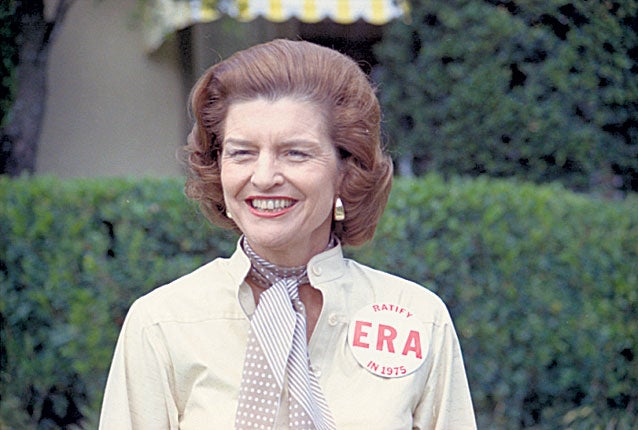Betty Ford's life was about more than just clinics

It has been said that Betty Ford was the first First Lady to leave a larger mark on American life than her husband. Gerry Ford, as the New York Times put it, "served a mere 896 days, much of it spent trying to restore the dignity of the office of the president."
After Watergate and Nixon, 1974 to 1977 was a "time to heal", the title President Ford gave his memoirs. He largely succeeded, and, even against his wife's laudable works, it was no mean achievement.
Betty Ford was also into healing, best exemplified by the Betty Ford Clinic, later Centre, a subtle nudge to the idea that the best way to deal with addiction is through damage limitation and treatment rather than by ridicule and punishment.
Mrs Ford, pictured, was a compassionate and progressive Republican of a kind which is almost extinct now. The First Ladyship is the nearest thing that the Americans have to UK royalty – a symbolic post, a national representative at home and abroad, supported by the taxpayer, but with no salary or formal powers, just an opportunity for the incumbant to provoke thought and debate.
Its occupants are unelected; there purely by chance.
Jackie Kennedy was the most regal, sometimes eclipsing the famous dynasty she married into, just as Princess Diana did, and retaining fame and glamour long after the passing of her formal role.
But Jackie, like Diana, had no political influence – and not much private influence– over a philandering husband.
The abiding legacies of the first ladies are scant: a century ago Nellie Taft organised the planting of the 3,000 Japanese cherry trees that still delight visitors to Washington; Lady "Bird" Johnson limited the size of billboards on freeways; Barbara Bush gave birth to George W.
Mostly, echoing British royalty, it's all about charity; Michelle Obama's campaign to improve children's diets, ex-librarian Laura Bush's work on literacy, Rosalynn Carter's on mental illness, Nancy Reagan's "Just Say No" to drugs, Pat Nixon's honouring of volunteers.
Few have been "powerful", even when given the chance.
Mrs Carter sat in on cabinet meetings and policy discussions, but made no discernible impact on husband Jimmy's (lack of) success. Hillary Clinton's assignment to reform heathcare for Bill has only just, two presidents later, been completed.
Hillary now exercises executive office in her own right. Eleanor Roosevelt, distant cousin and widow of FDR, was approached by his successor, Harry Truman, to be vice-presidential running mate in 1948. So Hillary and Eleanor, both long-suffering victims of infidelity, acquired power after the White House.
What of the two first ladies who were "secret presidents"? Even to her hostile biographer Kitty Kelley, Nancy's malign presence had only minor effects – encouraging Ronnie's already susceptibility to astrology, say. Woodrow Wilson's second wife, Edith Bolling, acted as gatekeeper for him, but was no more able than he to ensure America took a positive international role after the First World War when public opinion was so hostile.
Said Betty Ford: "I am an ordinary woman who was called onstage at an extraordinary time. Through an accident of history, I had become interesting to people."
Interesting, yes, like our royals; but not very important.
Subscribe to Independent Premium to bookmark this article
Want to bookmark your favourite articles and stories to read or reference later? Start your Independent Premium subscription today.

Join our commenting forum
Join thought-provoking conversations, follow other Independent readers and see their replies